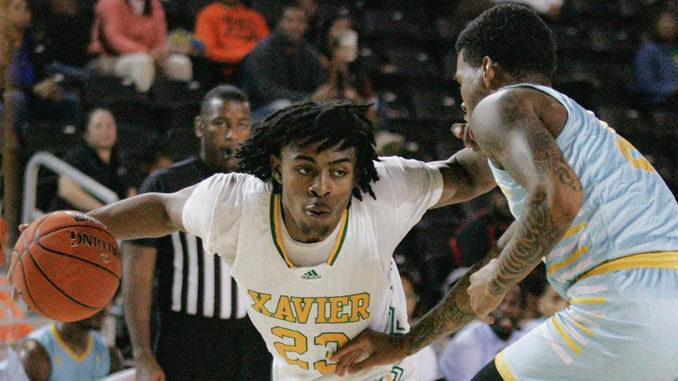
Photos Courtesy By Xavier Athletics
Kareemah A. Muhammad Data News Weekly Contributor
For athletic programs at Historically Black Universities, it is once again “Prime Time.” The National Student Clearinghouse Research Center found that since the Pandemic, more Black top-level high school athletes are committing to HBCUs at a rate not seen in recent years. While college enrollment has been down across the nation, HBCUs have seen a reverse trend with an uptick in enrollment and their athletic programs have been put in the spotlight.
Public figures such as Professional Football Hall-of-Famer Deion Sanders, who has led the Jackson State University Tigers for two years (2020 to 2022) as head football coach revived Jackson’s football program and provided the Mississippi HBCU with its first undefeated season ever.
Prime, who is a Florida native, brought national broadcast networks and major celebrities back to the HBCU campus to spotlight the iconic half-time performances and the tailgate experience, as well as the talent. “Coach Prime’s” main strategy was also securing high level recruits. He drew five-star recruit Travis Hunter straight out of his high school career, making Hunter the first highest-ranked prospect to select an HBCU.
In other popular sports, four-time NBA Championship Winner Shaquille O’Neal’s son, Shaqir O’Neal, committed to play basketball at HBCU Texas Southern University. While Sanders recently accepted the head coach position at the University of Colorado-Boulder, student athletes in the past said they were often told that HBCU athletic programs could not take their careers to the next professional level. However, now HBCU student athletes are increasingly being considered for professional teams, which has changed the college possibilities for Black student-athletes.
“To be able to see top Black high-school basketball players show interest in HBCUs, then deciding to commit is really inspiring,” said Lance Williams, a sophomore guard on the men’s basketball team who is from Baton Rouge and is studying Business Management. “It makes me feel like I made the right decision, and it makes others recognize that HBCUs can compete at the same level of all of the top PWIs sports too,” Williams said.
HBCUs do not always have the same resources. Prime took a salary of $300,000 at Jackson State and is reported to earn roughly $5.9 million a season and a total of $30 million for a 5-year deal. HBCUs are often overlooked by Black student athletes as predominantly White institutions are said to put forth more money, and resources into their programs, which ultimately attracts more top athletes seeking a professional career after college. However, in most recent years, that has all started to change.
“Growing up in Los Angeles top football players going to HBCUs wasn’t really promoted nor were HBCUs heavily recruiting on the west coast either,” said retired NFL player and University of California Los Angeles alumnus, Gaston Green Muhammad.
“Although I am grateful for my journey, I thought I had to go to a school like UCLA or USC to get to the NFL. Knowing what I know now, I wish I would have been more open about going to an HBCU. The culture that surrounds HBCUs and being in a program that is meant for Black student-athletes is special. If I would have known then what I know now, I might have done things a lot differently,” Green Muhammad said.
The Mid-Eastern Athletic Conference (MEAC) found that since 2020 Morgan State University (MSU) and Howard University have had a 60-percent and 11-percent increase in applications with a 9-percent and 28-percent increase in enrollment since 2019.
“People are able to see the diversity that surrounds these HBCUs, and they gravitate towards them. When you crave that sense of authenticity that HBCUs carry, it is hard to look away,” Williams added.
Some of the biggest obstacles HBCU athletic programs have to face is the lack of funding and resources needed to attract and keep top recruits. Highlighting and promoting the success for HBCU programs and athletics becomes difficult in comparison to PWIs where their accomplishments hit the national stage for more regularly, which puts their athletes in the eyes of the professional teams, students said.
The lack of funding from HBCUs introduces another obstacle as they are not always able to provide full athletic scholarships, which is especially needed given that HBCU students are more likely to come from lower income families in comparison to other institutions.
However, what HBCU athletic programs lack in resources they offer in rich pride in fostering a cultural environment that appeals to Black student-athletes.
“I feel like regardless of the sport, it’s really cool to see top athletes that are well known show love to HBCUs,” said Tracy Steele, a sophomore guard on the men’s basketball team who is from North Little Rock, Ark. “It has really initiated a strong force of recognition for HBCUs that’s well deserved and I’m grateful to be a part of that change as well,” Steele added.
Recommended For You.



Be the first to comment